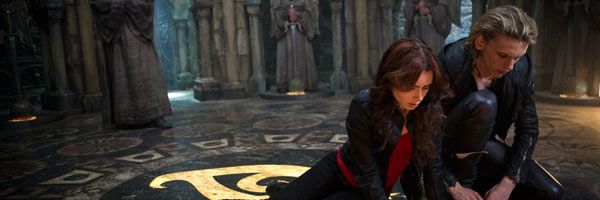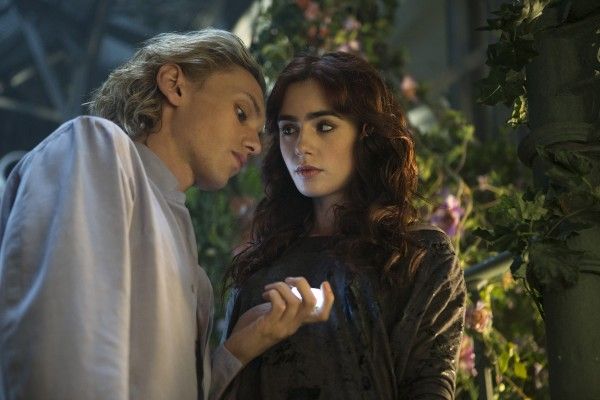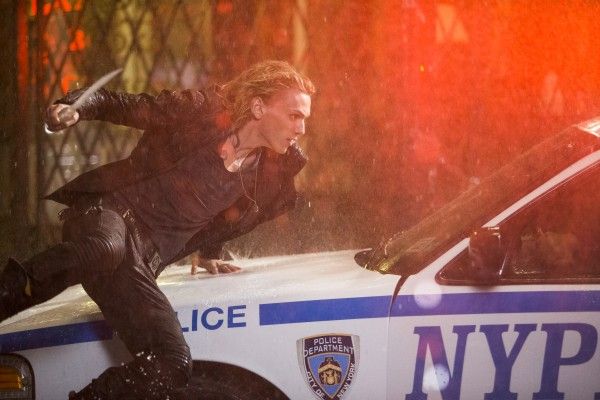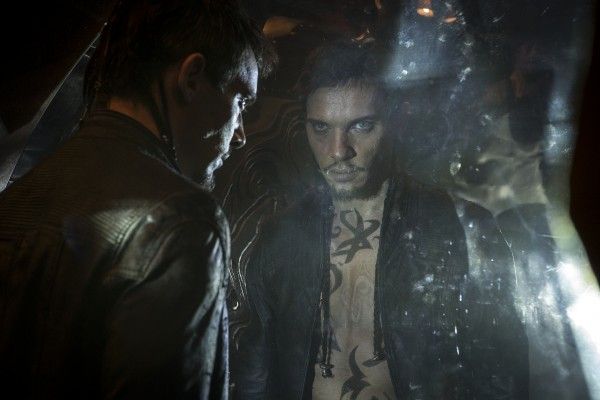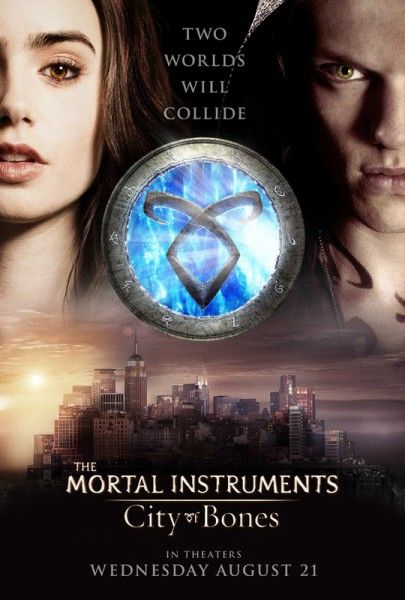Screenwriter Jessica Postigo Paquette began her professional career as a political journalist in Spain but has always had a lifelong passion for filmmaking. She was tasked with adapting the first book of Cassandra Clare’s blockbuster fantasy adventure series, The Mortal Instruments, to the big screen. The Mortal Instruments: City of Bones, directed by Harald Zwart from her adaptation, chronicles the adventures of Clarissa “Clary” Fray (Lily Collins), an ordinary young woman who suddenly discovers she’s part of an extraordinary destiny. Opening August 21st, the film also stars Jamie Campbell Bowers, Robert Sheehan, Jemima West, and Kevin Zegers.
At the film’s recent press day, Paquette talked about why she always wanted to be a filmmaker, the most challenging aspects of adapting the first book to the big screen, making a movie that appeals to audiences beyond the core fan base while trying not to stray too far from the source material, making last minute changes to the script as the filmmakers were going into production, and why she loves the world of fantasy. Paquette, who is signed on for the trilogy, also discussed her current efforts to adapt City of Ashes, the second book in The Mortal Instruments series, to the big screen. Hit the jump to read the full interview.
Question: It’s interesting how Lily Collins wanted to be a journalist, Cassandra Clare was a journalist, and you were also a journalist.
JESSICA POSTIGO PAQUETTE: I was. Oh, is that funny! I was a journalist in Spain. I was raised in Spain. I wrote about politics, and here I am writing fantasy. Who would have expected that?
That’s kind of similar, right?
PAQUETTE: Right. In intent, yes. Absolutely.
Why did you leave journalism to become a filmmaker?
PAQUETTE: I always wanted to be a filmmaker since I was a kid. I moved to Spain from the States when I was seven. My father was Basque. After a dictator had been in power for 40 years, it was time to go back and know that side of the family. Film was a huge escape for me. It was a way to escape. I went from not speaking Spanish to being thrust into a Spanish-speaking school, and on the weekends, it was just about film, so it was my escapism. I always wanted to be a filmmaker, but quite honestly, there was no film school when I went to college. My father was a photojournalist so I became a journalist. I wrote for a national newspaper and I absolutely loved it. But then, I was offered a job in advertising, so I was working in advertising. I traveled a lot, but it got to a point where I said now is the time to follow your dream, and I packed up my suitcases and I came to Los Angeles. I’d never been here before. I didn’t know where I was sleeping the first night. And here I am 15 years later with The City of Bones.
What was the most difficult aspect of adapting the book to the screen?
PAQUETTE: There was a big backstory that needed to be condensed, that needed to be brought down and focused. I focused on it being Clary’s story and living in the moment. I had to let go of a beautifully rich back story, but I wanted to not fall prey to too much flashbacks and voiceovers. There’s a little bit of it. I believe that we didn’t have a choice, unless we were just talking heads. I wanted to focus in the now, in the moment, and what Clary’s story was and what was indispensable to tell about her story that needed to move her character or the story forward in that sense.
And then, there are so many characters in it. There are characters that we had to let go of because they weren’t physically present within the movie. You want to make sure that all the characters that are there are not just standing by like wallflowers, but are willing participants in each scene. You can’t talk in the movie about characters that aren’t there. I know some of the fans had issues with Alec and those parents not being around. The ending also was a big challenge. It was difficult for sure.
He has the cup in the book and she’s got the cup in the movie.
PAQUETTE: Well, that was an issue and also knowing that the book is one in a series of books. If movie one doesn’t do well, there won’t be a movie two. So, as much as we would love to make the movie just for the fans, you’ve got to make a movie that will go beyond the core fan base. That was something that we struggled with a lot and up until editing probably. It was something that continued going. Here’s a movie where the girl doesn’t get the guy, the mom doesn’t wake up, and she gives away the Holy Grail of the Shadow World. So, shoot me right now. That is an absolutely unsatisfying movie ending. You’ve got to find something. You’ve got to give them some kind of success or some kind of joy after everything she’s been through. I’ll be honest with you, it was definitely a struggle. It was, does she give him the real cup? Does she give him a fake cup? And, even though she has her mom back, she’s in this coma that nobody understands.
Did you look at other films that have been adapted, especially for the young adult audience, where you have this very rabid fan base that’s watching while the film is being made? Were you concerned about straying too far away from the source material?
PAQUETTE: That was always one of Cassandra and my [concerns]. I have so much respect for the world she created, and I wanted to be as honest as possible to what she had done. I was very intent on finding all those fan favorite lines and moments and making sure that we honored them and included them. It was always trying to make sure that was there. It’s like anything in life. You can’t focus so much. Of course, I was a big fan of Harry Potter, The Lord of the Rings, and The Hunger Games. I know them all. I read them all. Of course, you have those, but you can’t be there focused on comparing yourself in that because you get lost in that, and I needed to bring my focus back into trying to do the best job I could with this one. I remember the core movie jumping out at me when reading the book, but yeah, I was focusing on this one at the time. I mean, having been a fan and having read all the other ones – the screenplays, books and movies --- just as you do as writers, you read other writers’ pieces and you learn and you grow and you read fiction and non-fiction and everything. I read a lot of screenplays as well because it just helps you improve your craft.
What did you learn about yourself in the process of working on this?
PAQUETTE: I found it a very humbling experience to be writing something and to be adapting someone else’s work at the same time, because you want to again honor them and be careful, but you can’t write or live from a place of fear where you’re fearful of disappointing the fans or disappointing the author. So, you just have to focus on trying to do the best job you can, stay strong, and block out the clutter and the noise around you, and quite honestly, realize how important your family is and all. After sometimes some tough days or some good days, they all don’t matter. You look at your kid’s face. I don’t want to be [ungrateful]. I’m so grateful. I had a great team of producers and the director, and they’ve signed me on for the trilogy, the three books, and that is rare. They’re incredibly collaborative. It’s definitely been a team process, and I never would want to say that I haven’t been grateful. But after it all, movies come and go, and some people might like them and some might not like them at all. And no matter what, again you go home and you’ve got your family, and I’m grateful for that because that’s real. After opening weekend, they’re still going to say, “Mom! You’re the best.” (laughs) No matter what reviewers might say.
How old are your children?
PAQUETTE: They’re four and six. My 4-year-old was six months when the book was sent to me. So they’ve lived through this, and they’ve heard all the processes and the goods and bads and the tougher and easier. They’re like, “Mom, are you going to Canada again? C’mon!” And then, when we were at the table read last year, I kept on getting a Skype call and saying, “Declining, declining.” And finally, I thought I’d better answer it, and my daughter had just cut herself. “Take her to the emergency room.” It’s like, “Oh!” and I’m not there. It kills you, but she was fine. She got some stitches.
Was it a bigger challenge to adapt something like Burroughs’s Tarzan where there are so many versions than something like this which hasn’t been adapted into a screenplay before?
PAQUETTE: With Tarzan, there was a very clear, straightforward story. There was a director already on board that had a treatment that was in animation. He already had to get his animators started, so he had created this world, and he had a very clear intention of what he wanted. He wanted a simple story. He had a very clear, but more visual idea of what the movie was, and I came in and created the story and the characters and so forth. Don’t reinvent the wheel. That’s the bottom line.
Which part of the book was the most difficult to adapt in terms of the visual effects and the fantasy elements?
PAQUETTE: When we were flying back from Canada last week, where we were in pre-production on the second movie, the producer said to me, “I feel like this is a piece of jazz that they give you the core and you elaborate on, and you go in one unexpected direction and then go in the other.” I mean, it’s been expanded upon a bit again while staying true to this. There are visual ideas. Again, Harald is a very visual guy, so he had very specific ideas. A lot of us were in the room after the table reading with Cassandra and Harald and the producers. After the actors went through the script, they came up with different ideas like, “How about if we do this?” We were writing until the last moment. I think production was pulling their hair out when they were getting the script Sunday night before we were shooting on Monday morning because there were last minute things that were evolving and developing a little bit. And, on set, so much stuff happened also that was not even in the script. There’s a moment when you start with Clary drawing the rune. She wasn’t going to be doing that. She was going to be watering plants and talking to Simon. And, before you know it, it’s like, “Hey, how about if she draws this rune on the dust or in the morning mist?”
You started out in film doing a documentary. Do you aspire at some point to do another documentary of some sort?
PAQUETTE: I think that one of the beauties of film today is fantasy. I was a newbie to fantasy about 11 years ago when I adapted a short story and that’s what got me started with the screenwriting. That’s how I got my agents and my lawyers. I got a blind deal at Warner Bros. at the time. I went on to adapt House of the Scorpions for Warner Bros. They never ended up making it because I think I was newer to fantasy. I wasn’t a fantasy geek from the get-go. I was surprised by it and I just thought, “Wow! How fun! Speaking of transporting you to different worlds!” I am definitely fascinated by the possibilities that live around us, and the unknown, and science fiction, and so forth. We have no limits in today’s world with film, television and documentaries. I love that it is much less compartmentalized now and we can cross over. So I close out no options.

